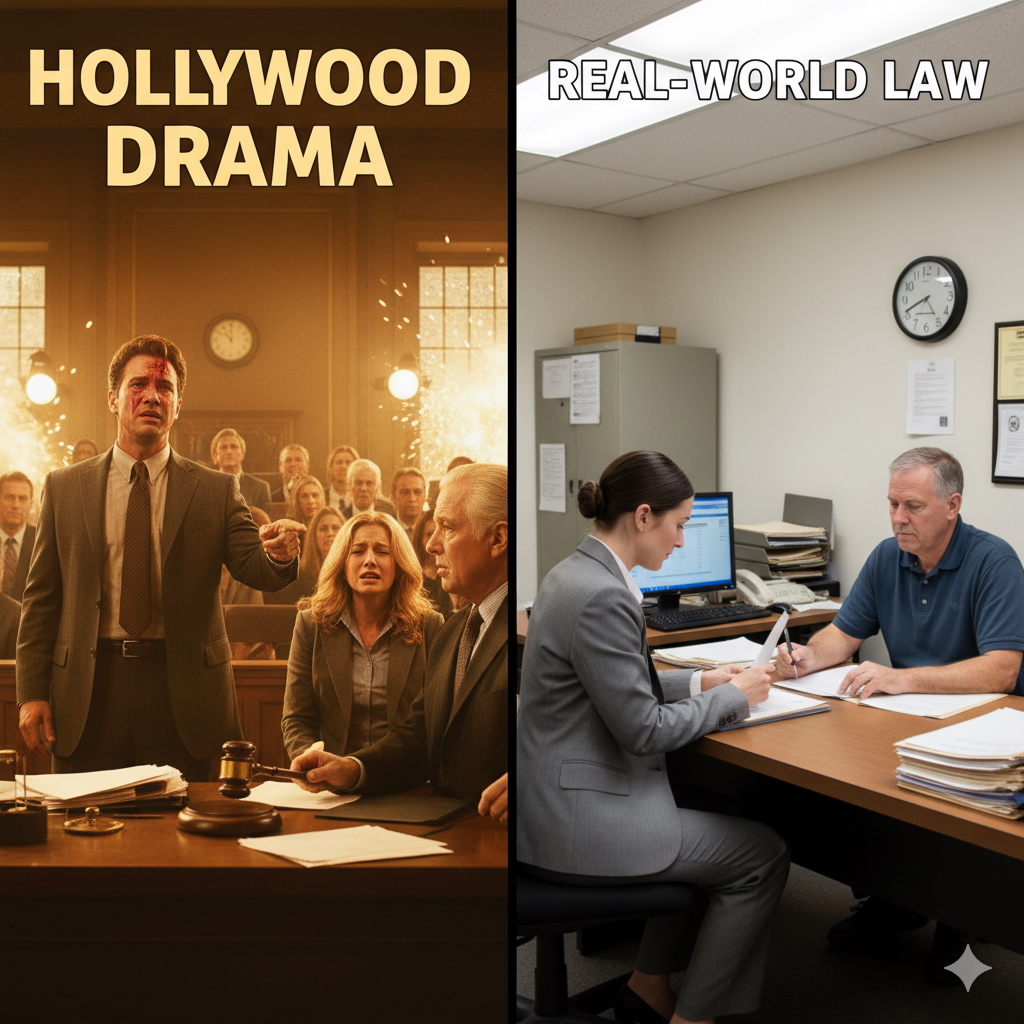We’ve all seen it in movies: a lawyer bursts into the interrogation room and commands, “Stop questioning my client!” Cue the dramatic music.
It makes for great cinema, but here’s the truth: in real life, the words that protect you aren’t shouted by a lawyer. They’re calmly spoken by you — before a lawyer ever arrives.
I’m Joel Chorny, and I defend people in Arizona’s criminal system. Let’s break down the myths, the realities, and what actually keeps you safe when you’re facing police questioning.
The Myth vs. the Reality
Yes, I’ve had my own “movie lawyer” moment, and I’ll admit — it felt pretty cool. But here’s the catch: by the time I got there, the client had already talked. The damage was done.
That’s what Hollywood leaves out. The real rescue isn’t loud or dramatic. It’s quiet. It happens when a person refuses to be interviewed and refuses consent to a search.
What Invoking Counsel Really Means
Invoking your right to counsel doesn’t mean a lawyer magically appears to sit beside you while you answer questions. What it really means is that questioning should stop completely.
In practice, officers may still try to keep you talking. They may circle back later. That’s why the safest — though hardest — choice is simple: don’t talk. Don’t take the bait. Wait.
Why Silence Feels Impossible
Staying silent feels unnatural. From childhood, we’re taught that honesty solves problems. But in a police station, honesty and candor are not the same thing.
You can be honest without volunteering information that will be twisted and used against you. Silence isn’t lying. It’s strategy. And when you add the pressure of a badge, a uniform, and a command voice, silence feels dangerous — unless you’ve practiced it in advance.
Real-World Scenarios
- The DUI Stop: Officer asks, “How much have you had to drink?” Client answers, “Just two beers.” That “just two beers” becomes an admission in the police report.
- The Search Trap: Driver says, “Go ahead, I have nothing to hide.” Officers find a forgotten backpack with contraband. Suddenly, it’s the driver’s problem.
- The Silent Client: A client follows my advice: no statements, no consent. That gave me leverage to challenge the stop, and the case was dismissed.
Miranda Isn’t Magic
Miranda warnings are not a shield. If you keep talking after hearing your rights, your words can still be used against you. Police may chat casually, suggest something is “off the record,” or talk near you hoping you’ll chime in.
Miranda works only if you work it — and that means silence.
The Suppression Myth
Some believe that if they talk after invoking, everything gets thrown out. Wrong. Suppression isn’t automatic, and dismissal is rare. Judges carve out exceptions like “good faith” or “inevitable discovery.”
Don’t gamble on what a judge might do later. Protect yourself in the moment by not talking at all.
Common Traps
- Making “just one little statement.”
- Thinking cooperation will win favor.
- Believing silence makes you look guilty.
- Answering “casual” questions like, “Where are you headed?”
Every one of those ends up in the report.
What You Can Control
There are searches you can’t stop — searches incident to arrest, inventory after a tow, plain view. But you can control whether you make it easier by consenting.
Exactly What to Say
Here’s the script:
“Officer, I do not consent to any searches. I am invoking my right to remain silent. I want a lawyer.”
For Spanish speakers:
“Oficial, no doy consentimiento para ninguna búsqueda. Estoy invocando mi derecho a permanecer en silencio. Quiero un abogado.”
Provide your license, registration, and insurance. Keep your hands visible. Be respectful. Be brief. Then stop talking.
What to Expect After Refusal
Officers may threaten a warrant, call a K-9, or keep you waiting. Don’t argue. Don’t resist. Repeat your lines and wait. If they search anyway, don’t interfere — just make note of what happened.
Respect for Good Police Work
This isn’t anti-police. Asking for consent is lawful. Refusing is lawful, too. The rules have to work both ways.
A 30-Second Drill
Here’s the drill I teach:
- Hands on the wheel.
- Provide license, registration, insurance.
- Say: “I do not consent to any searches.”
- Say: “I am invoking my right to remain silent. I want a lawyer.”
Practice it now so it comes out automatically under pressure.
What Lawyers Actually Do
In these moments, lawyers don’t tell clients to run or hide evidence. We work within the system. We draw boundaries, file motions, and challenge illegal conduct in court.
That’s only possible when the client has protected themselves first — by refusing to talk and refusing to consent.
Control the Situation, Protect Your Future
The dramatic “movie lawyer” moment only exists in Hollywood. In real life, the best defense starts with you staying silent and asking for a lawyer. Law Office Of Joel Chorny can guide you through every step of Arizona’s criminal system. Schedule your free consultation today and learn how to protect your rights, control the situation, and ensure your story is heard the right way.











